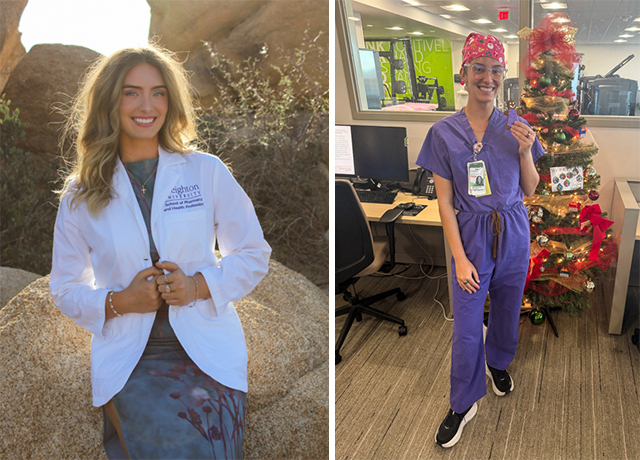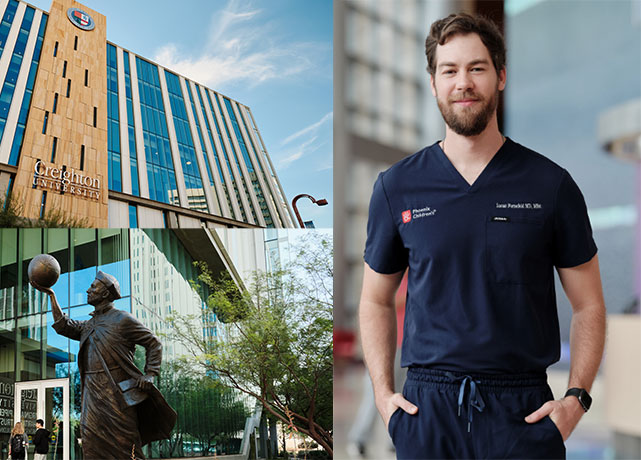Featured Testimonial About Creighton University
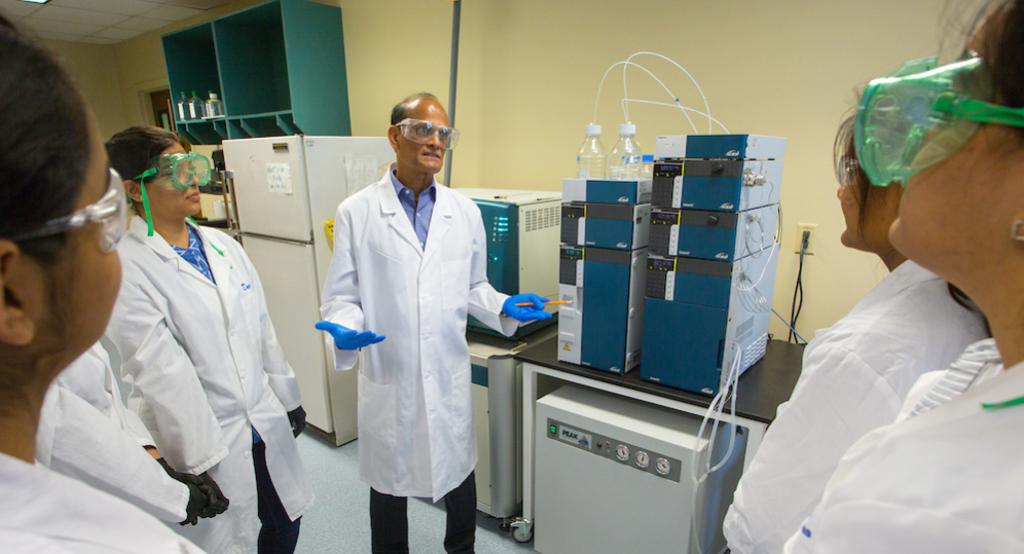
This program is important not only for our graduating students but also for retaining our faculty and maintaining Creighton’s reputation for excellence in research.
A recent gift from an anonymous foundation has made possible two game-changing additions to the School of Pharmacy and Health Professions: a new PhD program in the pharmaceutical sciences and a $500,000 piece of equipment, a Powder X-ray Diffraction instrument.
But before covering the details of Creighton’s new program and device, it’s important to highlight why each is so urgently needed.
* * *
By Micah Mertes
The pharmaceutical sciences face a challenge that most people outside the industry (and many inside the industry) aren’t aware of. The issue is this:
Of all prescriptions given to patients in the U.S., 7 out of 10 come in solid form — tablets, capsules, powders — while liquid and semi-solid forms account for most of the remainder.

The tablets and capsules we take have been developed by pharmaceutical scientists specialized in solid-state characterization of these dosage forms. In layman’s terms, these scientists study the physical properties of a drug in its solid form to determine how best to deliver it safely and reliably to a patient, in the right state and at the right amount.
These pharmaceutical scientists are responsible for the fundamental research that goes into every tablet or capsule we take. The problem, said Creighton professor Alekha Dash, R. Ph., PhD, is that there are and will continue to be fewer and fewer of these solid-state pharmaceutical scientists doing research every year in a nation where 90% of clinical drug development fails.
Dash — a professor, associate dean of research and the Gilbert F. Taffe, Jr. Endowed Chair in the Department of Pharmacy Sciences in the School of Pharmacy and Health Professions — is himself a specialist in the solid-state characterization of drug and dosage forms. Indeed, he’s an increasing rarity.
“The number of faculty doing fundamental solid-state characterization research is decreasing due to the retirement of those faculty and not enough students being trained to take their place,” Dash said.
It comes down to funding, he said. Faculty and student researchers seeking extramural grants can more readily find funding for pharmacological mechanistic studies pertaining to diseases such as cancer, Alzheimer's, TB or HIV. For those conducting fundamental research — such as the study of solid drug dosage forms — obtaining extramural funding is becoming more difficult. This means fewer young scientists are specializing in it, creating a higher demand with each new retirement of a seasoned faculty researcher.
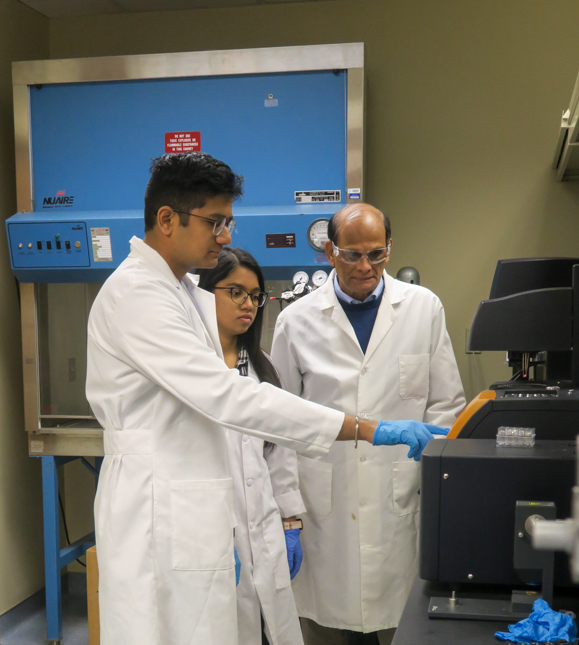
This brings us to Creighton’s new PhD program and the state-of-the-art equipment, both of which promise to bridge this gap. Thanks to the gift from the anonymous foundation, the School of Pharmacy and Health Professions can support four PhD students in the pharmacy sciences department.
The school is also in the process of purchasing the Powder X-ray Diffraction (XRD) instrument. The XRD is expected to arrive at Creighton in the early part of 2024. It will be the first of its kind available in Omaha.
If you’re an academic institution that wants to develop solid dosage forms of a drug, Dash said, you need this instrument.
“It will help us understand whether a solid being used as a drug exists in either a crystalline or amorphous state, which is critically needed for developing a delivery system for an optimal therapeutic outcome. It helps us identify other properties that are essential to know before we consider delivering a new chemical entity as a drug product in the future.”
The XRD will be available for use not just to researchers in the pharmacy sciences department or SPAHP but to faculty and students across the University, as well as visiting researchers. The XRD will be essential to Creighton’s first four pharmaceutical sciences PhD students performing solid-state research.
The department is currently recruiting these students, who are expected to begin at Creighton next fall. Dash will be instrumental in training these PhD students in solid-state pharmaceutics, and Somnath Singh, PhD, pharmacy professor and director of the graduate program of the pharmacy sciences department, will administer the new program.
Creighton has offered a Master of Science in Pharmaceutical Sciences since the mid-‘90s (just a few years after Dash joined the department in 1990).
The graduate program has been successful, Dash said. So successful that its graduates have gone directly to PhD programs at various top-tier research universities, including Purdue University, the University of Minnesota, the University of Iowa, the University of Wisconsin, the University of Michigan, Laurentian University in Canada and the University of Sydney in Australia.
Now, with the creation of the PhD program, these students won’t have to leave Creighton to continue their research and training.
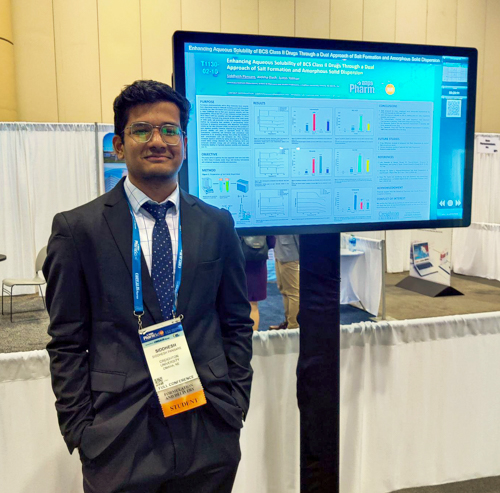
“This program is important not only for our graduating students but also for retaining our faculty and maintaining Creighton’s reputation for excellence in research,” Dash said. “We need faculty who are real researchers conducting cutting-edge research. We believe research is part of teaching, which is embedded in the valued center of education at Creighton University.”
Pharmaceutical sciences graduate student Siddhesh Pansare said the master’s program already resembles a PhD program in many ways.
“This program is more thesis-oriented than other pharmacy graduate programs,” he said. “Instead of courses and assignments, we’re learning by doing research in the lab. It will help us make a smooth transition from our master’s to our PhD program.”
Pansare’s thesis involves solid-state research. Specifically, he is testing the solubility of certain drugs within body fluids, combining the conventional approach of salt formation with a newer method of hot-melt extrusion. He hypothesizes that such a combination approach will improve drug solubility. Only a few schools in the country, Pansare said, are conducting such research in the area of hot-melt extrusion.
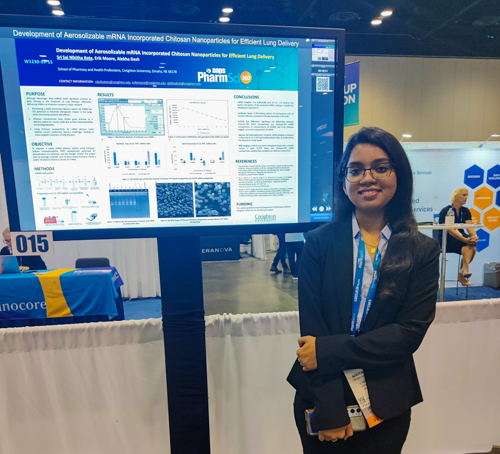
One of the obstacles to such research is time, said pharmaceutical sciences graduate student Nikitha Kota.
“A two-year master’s program isn’t enough time to complete a significant research project. So much of our time is spent building new skills. By continuing our education in a PhD program, we can continue and deepen our research. If we continue our education in a Creighton PhD program, we will be doing so in a department that feels like a tight-knit family.”
Both Pansare and Kota plan to graduate in May and apply for Creighton’s new pharmaceutical sciences PhD program starting next fall.
Ultimately, Dr. Dash said, the donor gift that is expanding this program — and addressing the demand for more pharmaceutical scientists in the field of solid-state research and beyond — will benefit many future students and countless future patients.
“With the investment of our donors, we are doing something unique,” Dash said. “The fruit might not come today, but it will be there in the future.”

